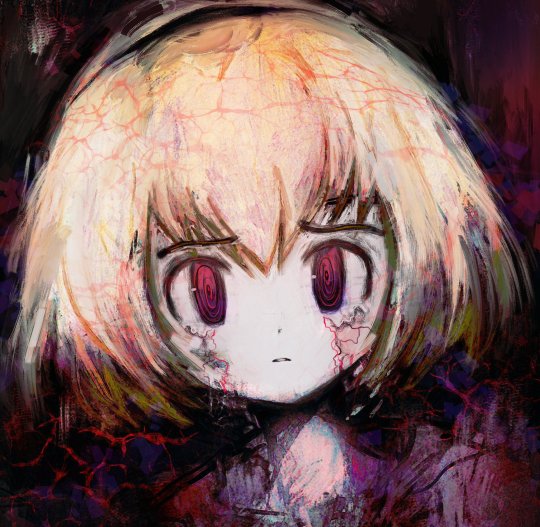nb mess, polyam, किरात राई progressive politics, Cornwall, U.K japanese media and subculture enthusiast
Don't wanna be here? Send us removal request.
Text
Spitballing a Fire Emblem Jugdral mod for a Paradox Grand Strategy game + Some Alt History Ideas
This idea originally started off as thinking about a Europa Universalis 4 mod since that's the only paradox game I've played, but thinking about it later, Crusader Kings is almost certainly a better choice. I just don't know the mechanics as well so what follows is mostly alt history ideas with some EU4 mechanics that I think exist in some capacity in CK. The primary religion of most of Jugdral would be something resembling either the way different Islamic Schools work in EU4, or like Hinduism with every nation being locked into choosing patron Deities representing the founding Dragon of that country. Cult of Loptyr would exist in a few scattered provinces.
Grannvale would probably be something resembling the HRE, with Belhalla as The Emperor. Their heir dies at war with Isaach, and a regency council is implemented for Belhalla given Azmur is too sick to rule. This council would comprise of Reptor, Lombard, Arvis, Ring, Byron, Claud.
Chalphy would have a unique mission tree and events to subjugate surrounding territories and incorporate them into the Empire's territory, and Sigurd would be heir for the earlygame, with insane general stats. Event would fire giving him Consort Deidre of unknown Dynasty. Verdane probably has razing mechanics so Horde-esque government. Agustria probably has Eastern tech or some kind of boost to cav to infantry ratio. Artillery probably get represented by Mages depending on tech group and Archers (which are worse) are what you get if you don't have the right tech.
If Sigurd succeeds in subjugating Agustria, a event will fire with most members of Grannvale declaring a coalition war on Chalphy, Silesse will ally Chalphy but be having a pretender war rebel problem that has to be sorted out first.
Winning that war triggers the event where Arvis assassinates Sigurd and Revokes the Privilegia. Gen 2 then follows as you'd expect with state religion being changed to Cult of Loptyr for the Empire, and this leading to a revolution with Seliph at the head of it.
But, more interesting than this is the potential for alt history. What if Sigurd dies early?
Well, presumably, Grannvale descends into a Civil War. If Veltholmer comes out on top, the same broad plot will unfold, Arvis will just have to finish the subjugation missions himself before Gen 2 can fire.
If another Grannvale Duke wins, then we'll assume Julius has been born already and Manfroy takes him away. Manfroy can then start his own revolution with Julius at the head, and Julius himself would not be Literally Just Loptyr at this point, so he'd take a similar role to Seliph. There might be some kind of event chain that could be used to delay him falling to Loptyr possession, because it could get pretty interesting if he hasn't consolidated power yet but changes state religion to the Cult, you could get another internal conflict, possibly between him and Julia (religious league war).
10 notes
·
View notes
Text
Some ramblings about Europa Universalis and history
I was supposed to continue with that Poland playlog but, ironically, the process of recording and maintaining a playlog made me want to play the game in a different file I didn't have to playlog in. Which then ended up becoming my focus. I'll talk about it a bit.
I chose to play Tibet for similar reasons that I chose to play Poland; it's a country that has been large and powerful in the past, but eventually became sandwiched between greater powers and divided up between them. Trying to understand how and why this happened and RP preventing it was a way for me to try feel less uneasy the reality of what this game generally expects you to engage in, expansionist violent conquest.
My Tibet game has gone pretty well, I finished the mission tree and have become an Empire. I control pretty much all of the Himalayas, and a significant amount of surrounding territory, along with Bengal, parts of western China and Vietnam. There were a lot of interesting stories in how it all unfolded, but I'm not here to relay those right now.
After I finished my mission tree (which mostly provides free permaclaims to old territory under the control of the ancient Tibetan Empire), I began to heavily invest in development of the country. Tibet is now a very rich Buddhist Theocracy ruled by a Dalai Lama, with the Clerical Estate privilege of "Inwards Perfection" which provides negative penalties for declaring war or taking provinces in peace deals, but improves your country's internal developments.
I built a strong Navy and developed even my expensive to develop mountain provinces till they became rich too. I have level 8 mountain forts with ramparts at all entrances to my country (invaders are losing thousands of men a month trying to get inside). I am allied with Russia, who has the largest army in the world (who trust me a lot because I helped them reach the Pacific Ocean). I have been vassalising small countries in the Indian subcontinent and throwing my boundless excess money at them in subsidies to help them thrive. I have gifted money to nearby South East Asian countries to help them resist European Colonisers and I recently stood up to the combined might of Spain and France to prevent them from taking the land of small two province minor who would have certainly folded immediately (their other nearby ally abandoned them when France declared war, the AI knew it would be a stupidly hard war). I vassalised that country afterwards because me protecting them overcame their relations malus of Tibet being of a different religion.
This feels…good? I'm achieving positive things instead of just it being a series of bloody conquests?
But to get to this position, I had to go to war a lot. And I had to convert many provinces to Vajrayana Buddhism to maintain unity (being of a different sect was not permissible by the mission tree). Without conquest, I would have been stuck as a small poor country that hung onto independence by being hard to invade in the mountains till eventually the rest of the world developed more advanced military technology and capacity to sustain massive armies to override my natural defensive advantages. And I had to rely on the help of a gigantic Russia who colonised all of Siberia and is partaking in colonising South East Asia as much as it can get away with too.
It's made me have to step back and think a bit about why I'm even doing any of this. I worry I'm trying to give myself "clean" excuses to play a game about a topic I fundamentally dislike engaging with. And I'm unsure of where I stand on how I'm supposed to really interpret periods of history involving conquest and colonialism. Today I also realised I was kidding myself by thinking diplomatic annexation was a way of forming peaceful unions, you get a diplomatic reputation penalty and you upset your other subject nations by doing it. You're basically taking the land by force but the other country's government chooses not to say no. There is no real way to play this game without getting your hands dirty.
In the past, I had probably a pretty simplistic view of these topics as "things that happened in the past were bad and we try not to do that anymore". But playing this game has made me have to grapple with how concepts we established to bind our groups together (religion, cultural and ethnic identity, etc), a way for us to overcome small differences more and thrive as slightly larger communities just, stop working at a certain point because they ran into other communities that developed differently enough that they weren't compatible without some compromises. And generally those compromises were "do not interact" (not always viable when resources are scarce) or "war". The concept of a universal shared humanity as an alternative took centuries to become something people could unite around.
When your society essentially maintained and developed it's existence on the basis of opposing those outside the ingroup to achieve stability, the historical outlook on humanity seems pretty bleak, it feels like we were always doomed to have to commit atrocities en masse to get to a point we could stop committing atrocities. (not that we aren't still committing atrocities…).
I realise this has been a bit of a rambling post. I don't really have a solid answer for some of these thoughts yet but I wanted to get some of them out somehow, somewhere. I think we are making progress, generally, but I do not want to end up in a perspective where I view horrible things in history as "good actually, because it was part of progress in the grand scheme of things". But I'm also reluctant to view us as inevitably doomed to have been warmongerers. Trying to find a balanced perspective in the midst of this is really hard.
6 notes
·
View notes
Text





I drew Julia based on the Cipher card by Megumi Nagahama! I really like this design of Julia a lot, and it’s perfect for spring!
21 notes
·
View notes
Photo


watch g-witch to warm ur gay little hearts this winter
5K notes
·
View notes
Text
Europa Universalis IV - No DLC Ironman Poland Beginner Run Part 2
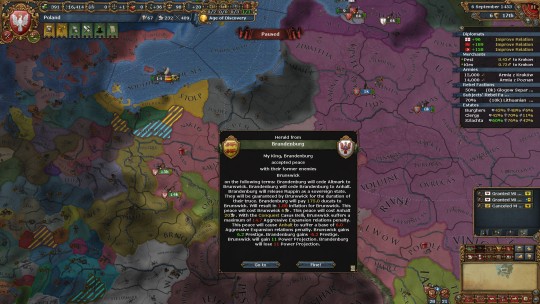
Brandenburg starts to get walloped after I pulled out of the War and has to start making peace deals. Then pretty much every HRE minor in the surrounding area wants a piece of the pie and jumps on them. The Emperor forced them to all give it back though, lol.

I would have said no to this given the 5% tech cost increase is going to really add up over the rest of game but I didn't wanna get sucked into another big internal conflict whilst I'm waiting for Danzig to fire.

Wolgast refuses tor return what territory it took though. In the meantime I had to deal with some rebellions whilst integrating new territory. Lithuania had a rebellion or two as well that I helped put down.
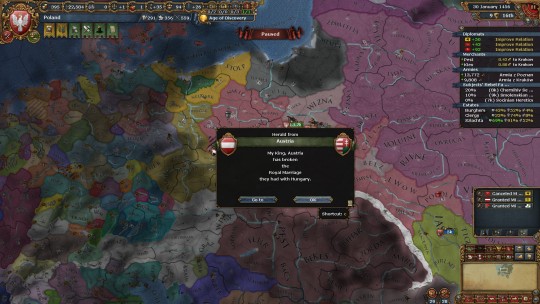
Hungary spurned the Habsburgs and split from them. I was able to capitalise on this and secure and Alliance with Austria. Should be useful vs the Ottomans.

I also allied Venice because they started the renaissance so they might share knowledge with me. And their armies will again, be critical vs the Ottomans.

I got a Cardinal and took the Cardinal related Estate Privilege.

Danzig still hasn't fired. I started annexing my three vassals giving the Estate privilege to avoid the diplorep penalty. At some point I was able to Vassalise Riga (OPM theocracy in the middle of the Livonian Order.

I really wanted to intervene here but I didn't want to get sucked into a huge war with Muscovy and stop the Danzig event going off (sounds familiar right?).
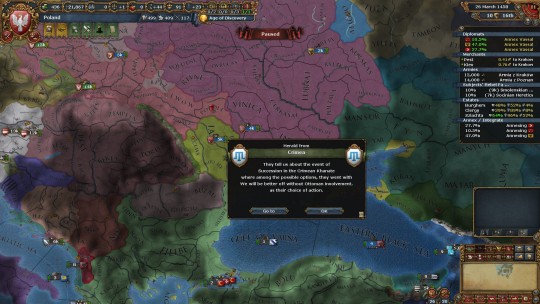
Crimea didn't get vassalised by the Ottomans, which is another huge relief for me.

Danzig finally fires. Odoyev had got annexed at this point.

The Teutonic Order has a REALLY good ally in Denmark, so Norway and Sweden got sucked into this too, which made me pretty worried to start with. I'll spare the play by play but what essentially happened is that both Crusader Knight kingdoms got slammed whilst the Danish navy sat somewhat pointless blockading ports, and just, not showing up at all. The AI seems to be really bad at using transports and didn't want to push through Novgorod (They may have denied them access? Wasn't keeping track)
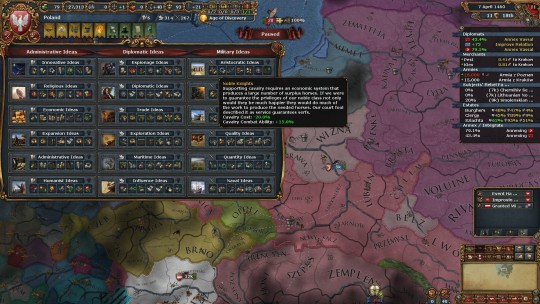
I took Aristocratic ideas in the meantime to pump my Cavalry.

Frustratingly, Hungary started a war with Wallachia that eventually turned into a full annexation. I was too tied up to commit to helping. If Teutonic Order didn't have such a strong ally it would have been possible to fight two wars so I let this go. Probably a mistake in retrospect, I could have let Venice and Austria do all the heavy lifting here, but I didn't know the AI was going to be so bad at attacking me.
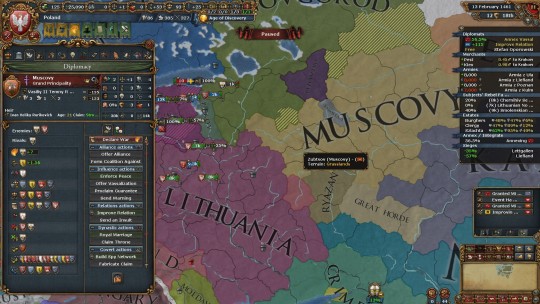
To makes things worse, Novgorod and Muscovy started fighting too. At this point I had the Crusaders on lock and Denmark had yet to do anything so I got cocky and decided to enforce peace (should have really gone for humiliate rival as a seperate war). This may or may not have been a mistake, because Denmark suddenly actually showed up the second I got into that war. I do suspect it had something to do with military access rules.

Basically what happened almost instantly after I got involved in a war with Muscovy. I think if I had just gone for a seperate war the Scandinavians wouldn't have been allowed through Novogrod. Military Access rules are things that do my head in a bit.
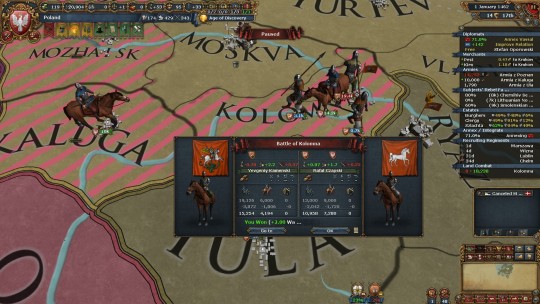
Clutch win

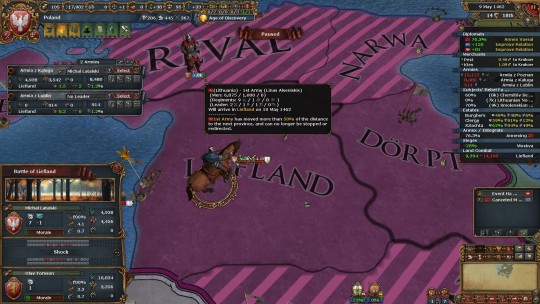


This was a huge gamble but it paid off, Lithuania won their battle and were able to reinforce in the nick of time to win the one to the south that I by all rights should have lost. I probably barely won thanks to the 10% morale boost I had from spending Papacy points.

Rip Wallachia. I'll free you eventually.

It was getting way too hard to fight on multiple fronts and Moldovia was about to finish being annexed, which was going to limit my manpower and force limit, so I peaced out with Muscovy, dragging one of their vassals out as well and hoped Novgorod could use the time and damage I'd done to avoid getting totally decimated.
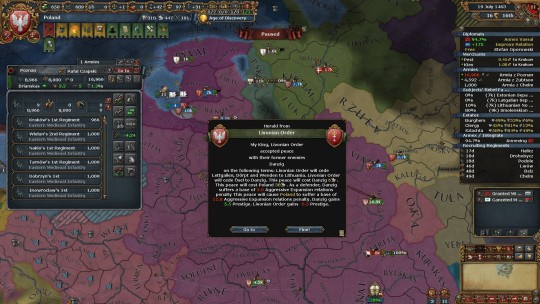
The Livonian's finally peaced out. I sent Lithuania 100 Ducats because honestly they did a lot of heavy lifting with their armies and I was concerned about their econ. I military access'd my way across the HRE to Denmark to siege them to make them fuck off at this point.
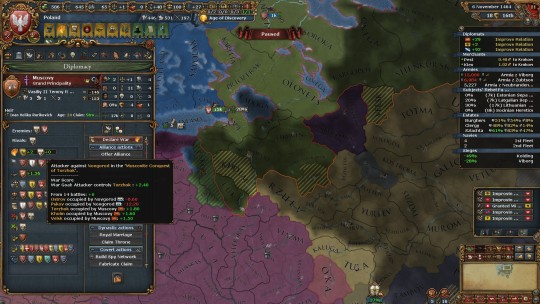
Muscovy got attacked by a Khanate from it's backside after it finished annexing one of its largest vassals mid war and that seems to have turned things around for Novgorod.

I am pretty upset at how much Hungary got done whilst I wasn't able to stop them. I'm unsure if I should be trying to dent the Ottomans or cut Hungary down to size first next at this point.
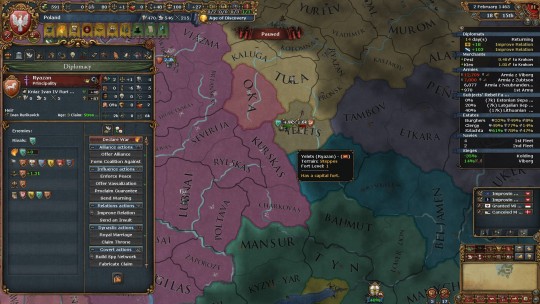
One of Novgorod's allies is also going to get eaten and I can't do much about it. :(
much about it. :(


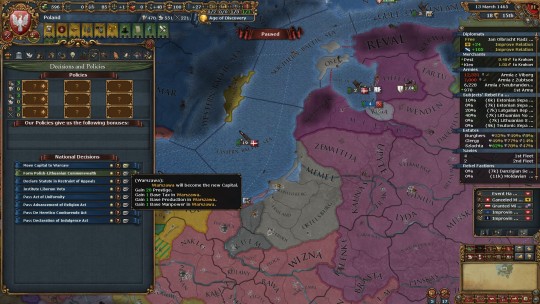
FINALLY OUT OF THIS WAR.
That does it for now. Time to rebuild and figure out if if I'm taking on Hungary or the Ottomans next.
1 note
·
View note
Text
Europa Universalis IV - No DLC Ironman Poland Beginner Run
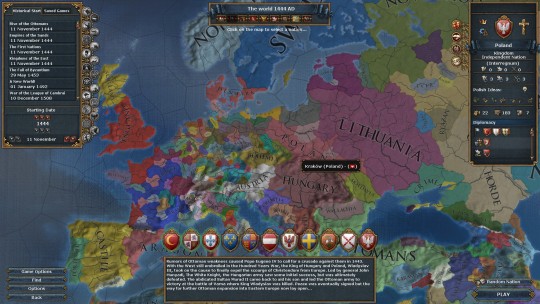
I'm a beginner to this game and I found myself constantly restarting instead of accepting my mistakes, despite playing Ironman to limit savescumming. So I am going to playlog here to try to hold myself to account better.
I had spend a while getting accustomed to things and getting over my own initial "ick" factor when it came to conquering territory, but I decided in the grand scheme of things, Poland is a country I'm happy to try to help become a superpower instead of being partitioned by its neighbours, given they were an incredibly tolerant country (for the era). Plus the Hussars are pretty cool.
To begin with, my goals are going to be
Reincorporate the Crusader Knight Kingdoms to the north into Poland and Lithuania, and maintain the Commonwealth as a tolerant and robust state in Europe.
Slow down Muscovy as much as possible and try to stop Imperial Russia forming, because they'll be a permanent headache.
Return the Balkans to native rule, probably by vassal feeding Bulgaria back it's cores in reconquest, ultimately removing the Ottomans from Europe.
Otherwise, try to grow in the way the game's missions encourage.

The usual start, summon diet, claim land. It's always nice to get the free Papal Points demand as your first Agenda.
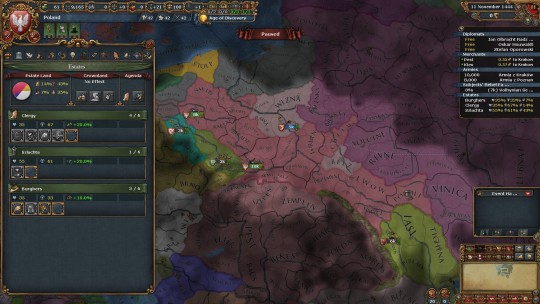
Poland's Sejm (Parliament) gives the nobility a huge amount of loyalty and influence by default so I don't need any other privileges for them. Burghers I enforced interfaith dialogue, gave orthodox autonomy and took the prestige boosting patronage of the arts.
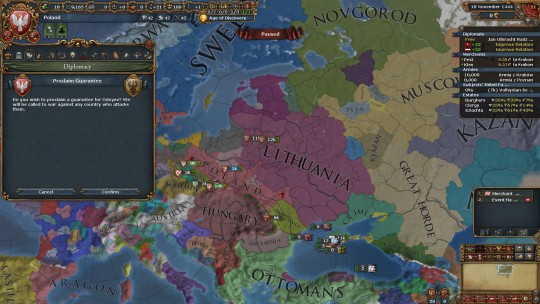
I allied Lithuania (you get a Personal Union over them very shortly anyway) and guaranteed Odoyev, a small state near enough to Lithuania that I can vassalise, getting to it before Muscovy can.
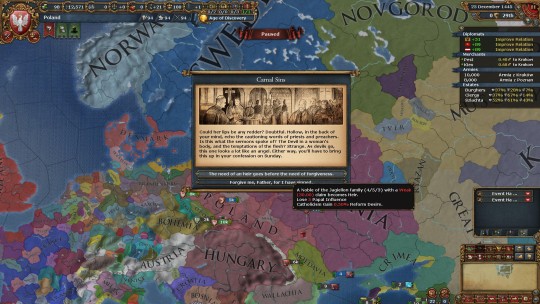
These are pretty good stats so I took the heir.
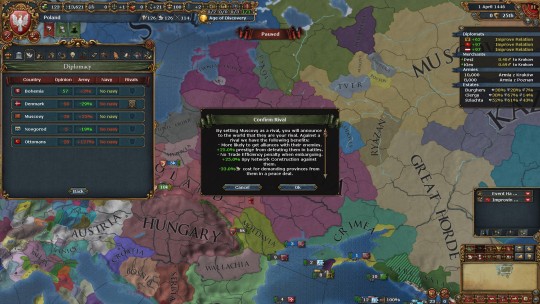
After a brief period of not having enough rivals (awkward), getting the Personal Union with Lithuania allowed me to set Muscovy as a rival. My rivals are now Hungary, Muscovy and the Ottomans.
I would like to be on good terms with Austria but they usually end up Allying Hungary. I will probably have to fight them later. So be it.
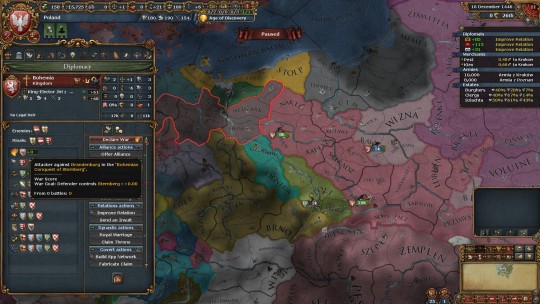
Bohemia started a war with Brandenburg pretty early on. I decided to ally Brandenburg to get dragged in, since most of Bohemia's territory is in the same cultural group as Poland (West Slavic), and it's vassals are in the Krakow Trading Node. But first I had to build to force limit and restore my army's morale.
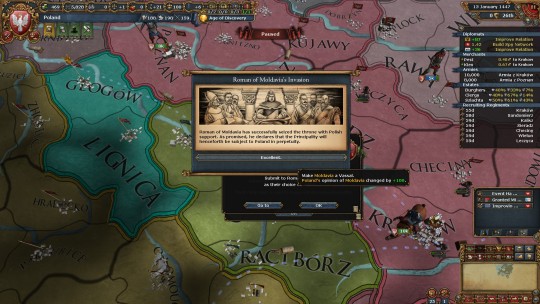
The Moldovan Vassalage event fired off successfully whilst I was building up my army. With two vassals, I could pick the strong duchies estate privilege, increasing my diplomatic relation slots.
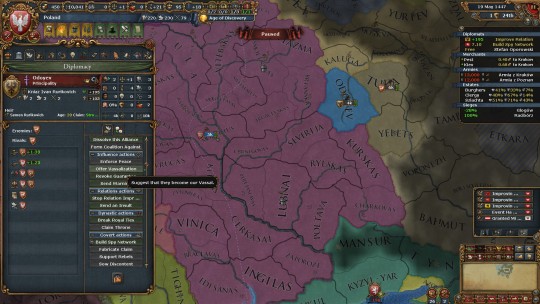
I just barely beat Muscovy to the punch on securing Odoyev as a Vassal. I had to send them a gift to hit the 190 rep in time.

The war went pretty well and I occupied Bohemia's vassals fully, before peacing out seperately. Unfortunately I didn't have any fabricated claims so it was a bit more expensive than I would have liked it to have been. I don't want to be in a war too long with Bohemia because the Danzig event is going to start being able to fire off soon in Prussia.

That about does it for this session.
1 note
·
View note
Photo

★ 【はんじゅくいぬ】 「 suletta 」 ☆ ✔ republished w/permission ⊳ ⊳ follow me on twitter
313 notes
·
View notes
Text
Trying to get back into using this website
You know who is ruining my main social media so let's give Tumblr another chance.
0 notes
Text
My thoughts on Nier: Automata

I'm late to the party on Nier:Automata, having only finished it recently (the game was released about 1 1/2 years ago).
I probably don't have a whole lot to add that hasn't been said already about this game, but composing my thoughts together in a more formal post is something that I hope will help me understand my own feelings better. And maybe you'll get something out of it too.
Obviously, this contains significant spoilers for Automata, but I also reference other games that Yoko Taro has worked on, mostly vaguely though. No direct spoilers, but still, you've been warned.
“There is scarcely any passion without struggle.” - Albert Camus
I've been a Yoko Taro enthusiast since I was about 13 and first played Drakengard in a gaming cafe, way out in the Eastern Himalayas.
Why did I pick that game? I liked dragons. I'd always liked dragons since I was small. There was a big dragon on the cover. This wasn't complicated. Plus the age rating said I shouldn't be playing it. That's always interesting when you're a kid.
A perfect blend of intrigue for a 13 year old, where one is not quite a child, but not quite an adult. Childish fantasies intersecting with deepening awareness of the world and a desire to be more grown up.
Of course, I didn't think that hard about it at the time. I was just here to kill time during one of many visits to my family high in the mountains, which would often last months at a time.
What I did think hard about was the few hours of the game I got to experience. I'd never seen, heard, felt anything like it. Drakengard, hereby reffered to in shorthand as DoD (shorthand for the Japanese title, Drag-On-Dragoon), was less like a game and more like a full blown assault on my senses. The dissonant screeching and moody wailing of the soundtrack, the evil glint in the protagonist's eyes, the constant scorn my apparent ally, my partner, would show me...the atmosphere was something I'd never been exposed to before. DoD felt macabre, felt bleak, felt twisted.
I couldn't stop thinking about it, and even came back the next day just to play more, even though I couldn't save and had to restart from the beginning.
I resolved to find and play it entirely when I returned home, and did just that.
I was still too young to really understand the game. I just knew it fascinated me, that as off-putting and disturbing as it was (Ending B gave me nightmares), I could not avert my eyes. I could not stop playing. But when I finished and got to the final ending, I was just left confused.
Was this a joke? This is a joke right? It's definitely a joke.
But I wasn't unhappy or unsatisfied. Just confused. Everybody else who'd played it seemed to just think it was a crazy mess, entertaining just for how out there it was, so I couldn't look to others for answers. Their thoughts didn't seem to fit. "There's something more!" I thought. I was so confused I gave up formally trying to make sense of it. But I didn't forget about DoD.
Years later, I heard about Nier. "From the creator of Drakengard!"
That was enough to convince me I had to play it. I craved more of that special blend of insanity that DoD had shown to me, that I'd never really experienced anywhere else.
But Nier wasn't like DoD at all. It was...too normal? It was...too sentimental? Nier was almost boring to me.
I kept playing anyway. I finished the game and was again, mostly confused. Whilst the game had failed to make a strong impression on me like DoD had, it still left me wondering what exactly I'd just played.
And to top it off, it had canonised Ending E of DoD, the ending I'd written off as a joke all those years ago.
And so I began to think. And I began to slowly piece together an understanding. "It's something that's gritty but not for the sake of grittiness" was an early thought I bandied around. "It's actively trying to make the player feel uncomfortable, like a survival horror game...except the sense of dread doesn't stem from a fear of death. It's the horror of...life...?"
Close.
Either way, I thought DoD did it better than Nier did. Because Nier didn't really unsettle me in the way DoD did. It lacked punch. It felt watered down. When DoD3 somehow got made and I played that, despite the gratuitous hyperviolence, its goofy, offbeat tone with accentuated melodramatic flourishes didn't really impress me much. I began to wonder if Taro had lost his edge.
(I did however eventually came to terms with the game thanks to a quote from Taro about how he'd wanted to make a game "true to the spirit of Drakengard" that avoided simply being the same thing again.
In that, I could not disagree. If DoD is a game that relentlessly tries to beat the player into submission, DoD3 is a game that tries to kindly -comparatively- ask the the player to give up. DoD1 is the north wind trying to blow your coat off, and DoD3 is the "gentle" sun warming you up till you remove the coat of your own volition.)
As a result, when Nier:Automata was announced, I wasn't excited. Not only was it a sequel to the game I thought was his most boring, it was being developed at a studio who I already had a bone to pick with, Platinum Games. I won't get into exactly why I don't like their games; I love DMC1 and 3, it's not the genre thats the problem, sorry! The point is, didn't really care much. I wasn't excited for the game.
Even after it came out, and people started raving about it, I still didn't really care that much. "Yeah yeah, I'll play it eventually". I'd just seen too many people rave about how incredible Nier was to feel like I could trust anyone's opinions about these games. There were even tidbits of information floating around, rumors of how Taro had "softened up" in this game, which made me lose even more interest.
I wanted something bleak and unsettling. Something that would give the player a middle finger. Not an uplifting story in a smooth engine with clean and "fun" combat with a question that I believed had already long been answered "can machines be people?". Boooooring.
And by now I'd began to more precisely settle on exactly why I loved DoD so much to this day. It wasn't just how visceral the game was. I'd learned through my experiences with other "edgy" media that just senseless destruction and suffering wasn't very interesting to me.
It was DoD's capacity to somehow portray beautiful moments in the midst of hell, to humanise the inhumane, to enable you to weirdly reflect on how some things just felt "right", even if they were extremely unpleasant; these were the things that made me really remember and value DoD. It's a game that deeply criticises aspects of our nature as humans, but does so without descending into juvenile misanthropy.
And so, about 1200 words in, I've finally set the backdrop and I can talk about Automata. Or more specifically, how Automata successfully lives up to this legacy. And why I consider it a triumph.
You see, the me of the past didn't understand that Automata isn't a game about whether machines could be human. The game pretty much considers that a given.
Automata is a game about something that is gives rise to the most powerful feeling of dread that we can feel.
The horror of existing in a meaningless world.
And it doesn't shy away from this horror at all. Automata might not be as superficially gritty as DoD is, but it is in fact, much more unsettling in a much more significant way because of it's subject matter.
Automata is honest about how bleak the universe is if you don't have something or someone to hold onto. Nothing in this world is certain but death, and all our foundations can fall away at any moment. Our comforts and distractions are fleeting at best. We desperately need to keep our thoughts away from the underbelly of nothingness, the void of despair, lest we get sucked into it and be wholly consumed.
There have been countless examples of people - Philosophers, Self-Help Gurus, those who have recovered from depression and want to help others - trying to help others get to grips with this void. To become at ease with it it in some way, whether that be through embracing it as a validating and comforting thing, or to simply stand firm and hold it in contempt, with a refusal to let it have power over us.
But the way these ideas are presented is extremely backwards, and as a result, very inaccessible. These kinds of ideas don't make sense to someone who's hurting in the here and now. Such people only want to find some kind of refuge. And for the comfortable, the small minded, the discussion doesn't even seem relevant. After all, what's there to worry about?
Essentially, you have to be in far too specific a context to be able to get to grips with this kind of material.
But I think that in Automata, Taro succeeds where others have failed. And that's exactly because of his ability to depict beauty and passion that can only really exist in a fucked up context.
In Ending D, as 9S writhes on the floor in agony, dying, screaming, hurting, there is still something striking, something enrapturing about what's going on. His intense energy, his drive, his unwillingness to die are beautiful in their own right. 9S doesn't want to accept death even though he has nothing left to live for. He still yearns for his love, for days gone by, even though they're beyond his reach.
9S radiates passion with an intensity that can only be found in the jaws of death. It's through his struggle that this intense passion can flourish.
We're all stuck in an endless cycle of death and rebirth, but in our despair we focus too much on the inevitability of the former and not enough on the recurrence of the latter. There is rebirth even in death; the weird, messed up, memorable and powerful moments that are constantly being synthesised as our existences collide into each other. Indeed, as someone who identifies with dialectical monism, this type of duality is a central component to how I make sense of the world at all.
What happens in Ending E of Automata is an affirmation of this coming from the most unlikely of places. All the meaningless suffering everyone went through ended up giving rise to new life, as the Pods are "born" as true individuals.
None of us can know what's going to happen, or if any good will come out of what's currently happening to us, but I think that's the "faith" Automata asks us to have. That by moving forward, you move not only towards death, but towards life.
Automata knows you can't just tell people to get over existential angst. And it knows that words intended to guide you are likely to only seem condescending and confusing, as meaningless as everything else. It knows that too many people end up becoming like 9S, pathetic lost souls pointlessly lashing out at others, or directing their destructive frustrations inward.
So instead it tries to illustrate how death, the lack of permanence itself, gives meaning to everything that happens. That there is a value in what has happened to you, and is happening now. And then if you can see that value, you can see the infinite wonder of how countless others are struggling, trying to move forward, trying to find something, trying hold onto something, or trying to be at ease with nothing.
Automata knows it isn't enough to just say "you're not alone! you can do it!". It knows that you have to be able to appreciate this struggle on some level first before you can feel like it matters that you're all trying.
And it doesn't try to tell you that things are going to be great now either. It fully acknowledges that this struggle goes on and on, forever and ever, over and over. But it still dares to end optimistically. It still dares to hope. And it's because it's so honest about hardship that the hope it espouses feels real and whole. It’s because it’s so honest that I think it can and has reached people in ways that other works can’t.
Automata is a triumph because it has a message that is as profound as it is accessible.
I try to live in accordance to these ideas. I've been trying to do it for years. These thoughts are not new to me.
But I'm glad to have something earnestly, directly, wholeheartedly reassure me in a way that no philosophy text ever has. Because belief in the struggle is itself a struggle. It's hard to hold onto, much like everything in this life.
So thank you Automata. Thank you Taro.
I'm glad to exist, even if it hurts.
And I'm glad to know that I'm never really alone.
14 notes
·
View notes
Text
The Dialectical Monism of Gundam 00
Or, why that one meme about the cool robot and war is bad going over your head is a false dichotomy
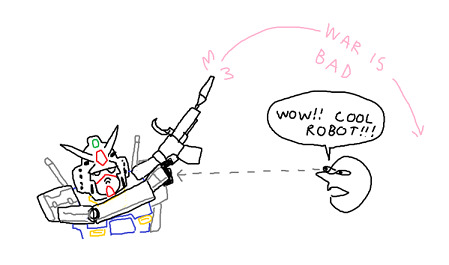
Form does not differ from emptiness,
Emptiness does not differ from form.
That which is form is emptiness,
That which is emptiness form.
Extract from The Heart Sutra
I dropped Gundam 00 back shortly after it began airing in late 2007, and have only recently revisited it. I dropped it for reasons very much like why you may have felt inclined to not even bother continuing to read this article after seeing the title and my opening gobbledegook; the unmistakable mark of pretentious posturing.
Indeed, before even 2 minutes of its runtime have elapsed, 00 has already leapt eagerly into the arms of religious symbolism, with all the subtlety of a hand grenade.
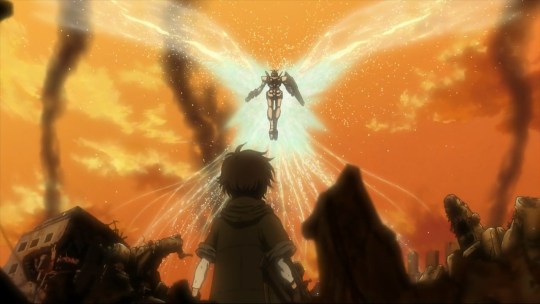
This isn't even a bad scene by any means, nor is it guilty of faux-symbolism. In fact, in many ways it's a great opening sequence, the kind of strong hook that longer shows benefit from. But this scene doesn't exist in a vacuum, and what follows begins to paint it in a different, souring light.
Once the opening credits have rolled, viewers are assaulted by a seemingly endless barrage of overwrought and empty theological allusions, punctuated by a soundtrack that so casually reaches for the liturgical that it becomes senseless. Combine this with textbook too-cool-for-school badass protagonists, complete with corny one liner catchphrases and a script where even the narrator never misses the chance to talk ominously about God's Judgement; the clumsy concoction of elements that make up 00's identity come together to create an atmosphere that feels so overly-inflated that it could burst at any second.
Graham's remarks in Episode 01 about the contradictory nature of Celestial Being, an organisation that seeks to use force to bring about the end of war, felt very much in line with my own thoughts about the contradictory nature of the show. How could something that relied on shallow posturing to try to elevate itself beyond stale cliches hope to really convey anything meaningful at all? How could a series that seemed content to merely invoke the sensation of depth instead of demonstrating depth actually have depth? How could a work defined by it's lack of substance produce anything of substance?
10 years and 1.5 rewatches later, a series of lines uttered once again by Graham near the end of the 00 Movie made everything click.
Setsuna : "I didn't come here to fight!"
Graham: "Why does your heart falter? You should be saying that you're fighting for the sake of living!"
Graham: "To continue that existence filled with contradictions!"
Graham: "That's what it means to live!"
***
Graham: "Young lad! I , Graham Aker, shall guarantee that you lead us to the future!"
Graham: "This isn't dying! This is ensuring that humanity will survive!"
In these brief moments, Graham captures the true essence of 00 as a series, a work that wholeheartedly embraces contradictions, two things seemingly opposed, as a ubiquitous, unified feature of existence.
You may be familiar with this concept, perhaps through the Yin and Yang of Taiji, or the teachings of particular forms of Buddhism, as embodied by the quote from the beginning. Contradictions, or opposites, are ultimately complementary, dualistic aspects of a unified whole, the ultimate reality. The unity of the universe can only be experienced through duality, and as such, nature embodies a contradiction, and this contradiction constantly produces complementary opposites that interact with each other, creating new syntheses.
With this in mind, many facets of 00 begin to fall into place. The two Lockons, the two personalities of the two Super Soldiers, every Innovader having a corresponding pairing, Setsuna's contradictory nature as a being who fights in order to stop fighting, the two distinctly different seasons that critique each other, the twin drive system and the infinity sign it leaves behind, the double O...indeed, the list goes on and on. 00's symbolism at large takes on a new dualistic form, where the superficial, Abrahamic facets are merely the other side of the coin of allegories, with the more subdued underpinnings of Eastern philosophy counterbalancing them.
So, what about the robot meme? Well if you haven't figured it out yourself already, to 00, the dichotomy between the cool flashy robots engaging in combat and the anti-war undercurrent is false because it doesn't perceive them as inherently being in opposition. They're just parts of the same whole. 00's ability to pull off insane moments like the Trans Am Raiser Sword, it's ability to turn Graham into Mr.Bushido, and ultimately create fun, engaging and inspiring moments whilst simultaneously addressing serious tragedies is because of its belief that none of these things really undermine each other as long as they’re presented in an earnest dualism. The thrill and spectacle of over exaggerated, slick action sequences should not, can not be rejected just because we know that fighting is undesirable. The tongue in cheek, self deprecating tone of the in-universe movie sequence is an open acknowledgement of this; Saji’s criticism of it is merely that it’s only half the story.
But 00 is not simply retreading ancient Taoist or Buddhist principles. The established, cyclical and repetitive outlook of traditional Eastern views (and for that matter, traditional Gundam views) is rejected, for 00's position is unapologetically optimistic and progressive. Setsuna, and consequently, mankind, changed for the better. They broke the cycle and reached a new level of understanding. This is in itself a dualism, for whilst the roots of the idea of a Universal Dialectic 00 puts forward are Eastern, the idea that this Dialectic is in fact a progressive "spiral" of evolutionary development is a Western invention.
Therefore, 00 is best described as a work that embodies what is commonly known as Dialectical Monism, a unification of Eastern and Western philosophy and quantum mechanics. Particularly fitting, given that the 00 Movie, an animated film made in Japan, ends with a quote from Albert Einstein, who was one of the main sources of inspiration for the enigmatic Aeolia Schenberg, the man who set the entire events of the story in motion.
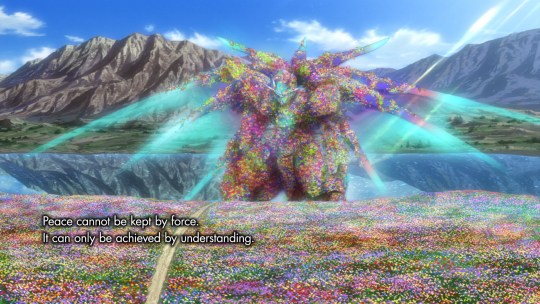
Dialectical Monism is why I view 00's optimism as truly poignant, as more than mere wishful thinking. For there is no "being" or "non being", merely a process of "becoming". All existence, including our own may be contradictory, but those very contradictions are what cause us all to progress, to innovate, as we move ever onwards, blazing a trail to the future.
42 notes
·
View notes
Text
From the New World / Shinsekai Yori – Ramblings
I loved this show.
One day I want to read the entire novel, but for once, that's less out of an urge for the definitive version and more for just a different interpretation. It might be lofty of me to say it before having read more than a chapter or two of the original, but the directing of the TV anime really does capture some moments and themes in ways a novel can't.
This is the point I should really be doing some kind of general plot summary for but despite the fact I've wanted to really write some thoughts down about this show I can't help but not want to even remotely have the chance of spoiling it for someone else? And what use is an analysis without some examples that probably count as spoilers? Ah...
I decided to just be vague, so honestly, this won't read well and is formatted badly. It isn't that much of an analysis so much as ramblings. Sorry!
People tend to criticise the early episodes for not being particularly eventful, and I know a good number of folk who dropped this show because of it. But to me that's such a foreign concept, the presentation of the first episodes are absolutely loaded with intrigue and mystery that I was sucked in immediately. The oddly feudal yet modern utilitarian era shown along with the flashbacks work with the slight cracks in reality shown to really make you start to think about what's going on. Honestly I'd say a large theme of the series itself is to question the unquestionable. Not that the truth will set you free by any means, but that the truth itself is powerful.
That ties in an interesting way to the actual way the viewer engages with Saki, the protagonist. We have something of a first person view with her, yet periodically we get extra viewpoints and insight. Somehow though, the viewer is never quite disengaged from her thoughts and beliefs, the story is incredibly personal yet very metaphysical. In a way it reflects on the nature of the show and somewhat fills in the internal monologue that would be present in a novel; broader ideas, worries and thoughts about the world and people within it are stimulated in such a way within the viewer's own mind that mirrors that of Saki herself. In many ways I found the show more empathetical than any other I've watched. Not that other series are bad at establishing empathy, but the kind of connection I had with Saki felt more substantial than what TV really usually manages to achieve. To achieve that kind of insight into someone's character and behaviour without relying on monologue is really impressive.
Perhaps I'm an outlier though. Most others I know were not as strongly drawn to the interpersonal relationships between characters as much. Especially when it comes to the somewhat complicated feelings of affection that the main cast has. I hesitate to say that the romance in the show is necessarily realistic but it is definitely highly believable. There isn't the usual frustratingly bland pairing that can be cute or endearing but ultimately unsubstantial. There isn't some dumb forced love triangle of sorts that people compete in. The way the characters feel about each other is far more complex and in many ways, is as mysterious to themselves as it can be to the viewer. That layer of uncertainty made it all the more poignant for me; Saki's conflicted feelings towards her companions are what adolescent emotional turmoil is all about. I found myself reflecting on a lot of my own past when watching, and grew shockingly attached to some pairings despite the ratio of time devoted to them. The intimacy and awkward tenderness is just so brilliantly done.
To many others the events of the story and some of the larger themes (that I won't spoil) within the final arcs and the way the show ties them altogether are the selling point. And I wouldn't disagree, those are masterfully executed as well. But for me, there was a really special emotional connection to the main group that I've never encountered in a TV format before, that achieved so much without necessarily saying anything. I almost find that more admirable than the complications of standard novel monologue. I'm not even really able to talk about directing conventions in that sense though, most of it is really beyond me. So I've just tried to scratch at the surface here in this awkward piece. Really, I had to wait almost a week to really stop feeling emotionally conflicted enough to coherently write something that wasn't just blubbing about how much I loved X or Y. Not to mention most of the scenes I'd want to talk about would just be flat out spoilers, which I didn't want to do either.
I've become rather an emotional romanticist that pretends to be pragmatic a lot, but frequently I'm highly cynical of standard anime melodrama that's over accentuated and forced. But Shinsekai Yori's emotional context is so much easier to compare to adolescent turmoil from something like Catcher in the Rye than most actual anime. Don't get me wrong, I have some complaints about the show too but they're ultimately minor compared to what I really found beautiful about it.
I suppose in spirit of ending things like that Turn A writeup I may as well toss in Dvorak's Symphony No.9 in E Minor “From the New World”, that this show uses shockingly effectively. I wonder if the author of the novel ever thought about the correlations or use of this piece in his original novel? Because what A-1 did with the two is really hard to put into words.
12 notes
·
View notes




